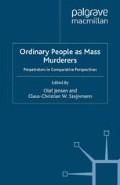Abstract
Genocide, crimes against humanity and war crimes all have two things in common: the number of victims is very high and numerous perpetrators are involved. Thus, these are mass crimes in a double sense. Although according to legal definitions a single act of murder can constitute genocide, case law — in particular as it has been handed down by international criminal courts — categorises crimes as genocide only when it is apparent that the number of victims substantially exceeds the dimensions of normal crimes (even when precise numbers are not or not yet available).1 The same holds in the case of crimes against humanity; here, the legal definition presupposes a widespread or systematic attack directed against a civilian population. And war crimes are especially abominable because they are generally committed on a large scale and as part of a plan or policy.
Access this chapter
Tax calculation will be finalised at checkout
Purchases are for personal use only
Preview
Unable to display preview. Download preview PDF.
Notes
Thomas Mann, Fragile Republik. Thomas Mann und Nachkriegsdeutschland, ed. Stephan Stachorski (Frankfurt/Main, 1999), 45.
La Paix de Versailles, Responsabilités des auteurs de la Guerre et Sanctions (Paris, 1930), 538
Robert Lansing, ‘Some Legal Questions of the Peace Conference’, American Journal of International Law, 8 (1991), 631–50.
Cf. Taner Akc¸am, Armenien und der Völkermord. Die Istanbuler Prozesse und die türkische Nationalbewegung (Hamburg, 1996 ), 77–121.
Matthias Arning, ‘Anklage gegen frühere SS-Männer gefordert. Antifaschisten halten Staatsanwaltschaft Verschleppung vor/Bundesweite Aktionen zum 8. Mai’, Frankfurter Rundschau, 6 May 2006, 4 (translation G.H.).
Cf. Friedrich Andrae, Auch gegen Frauen und Kinder. Der Krieg der deutschen Wehrmacht gegen die Zivilbevölkerung in Italien 1943–1945 (Munich, 1995 ), 208–10.
Cf. the definition in William A. Schabas, Genocide in International Law (Cambridge, 2000), 314.
Ibid., 316–44; Christiane Nill-Theobald, ‘Defences’ bei Kriegsverbrechen am Beispiel Deutschlands und der USA. Zugleich ein Beitrag zu einem Allgemeinen Teil des Völkerstrafrechts (Freiburg/Breisgau, 1998 ), 5 7–61
Kai Ambos, Der Allgemeine Teil des Völkerstrafrechts. Ansätze einer Dogmatisierung (Berlin, 2002), 111–13, 543–5, 825–7
Gerhard Werle, Principles of International Criminal Law (The Hague, 2005), 138–40.
Albin Eser, ‘Defences in War Crime Trials’, in Yoram Dinstein and Mala Tabory (eds), War Crimes in International Law (The Hague, 1996), quoted from Schabas, Genocide, 341.
George Fletcher, Rethinking Criminal Law (Boston, 1978), 759; quoted from Schabas, Genocide, 315.
Quoted from Adalbert Rückerl, NS-Verbrechen vor Gericht. Versuch einer Vergangenheitsbewältigung (Heidelberg, 1982), 253.
Cf. Neue Juristische Wochenschrift, 16 (1964), 731.
Cf. Anton Roesen, ‘Rechtsfragen der Einsatzgruppen-Prozesse’, Neue Juristische Wochenschrift, 4 (1964), 133–6
Hans Welzel, ‘Gesetzmäßige Judentiitungen?’, Neue Juristische Wochenschrift, 12 (1964), 521–3.
Cf. Heribert Ostendorf, ‘Die–widersprüchlichen–Auswirkungen der Nürnberger Prozesse auf die westdeutsche Justiz’, in Gerd Hankel and Gerhard Stuby (ed.), Strafgerichtegegen Menschheitsverbrechen. Zum Völkerstra frecht 50 Jahre nach den Nirnberger Prozessen (Hamburg, 1995 ), 78–9.
Editor information
Editors and Affiliations
Copyright information
© 2008 Gerd Hankel
About this chapter
Cite this chapter
Hankel, G. (2008). International Law after the Nuremberg Trials and Rwanda: How Do Perpetrators Justify Themselves?. In: Jensen, O., Szejnmann, CC.W. (eds) Ordinary People as Mass Murderers. The Holocaust and its Contexts. Palgrave Macmillan, London. https://doi.org/10.1057/9780230583566_10
Download citation
DOI: https://doi.org/10.1057/9780230583566_10
Publisher Name: Palgrave Macmillan, London
Print ISBN: 978-1-349-36258-5
Online ISBN: 978-0-230-58356-6
eBook Packages: Palgrave History CollectionHistory (R0)

